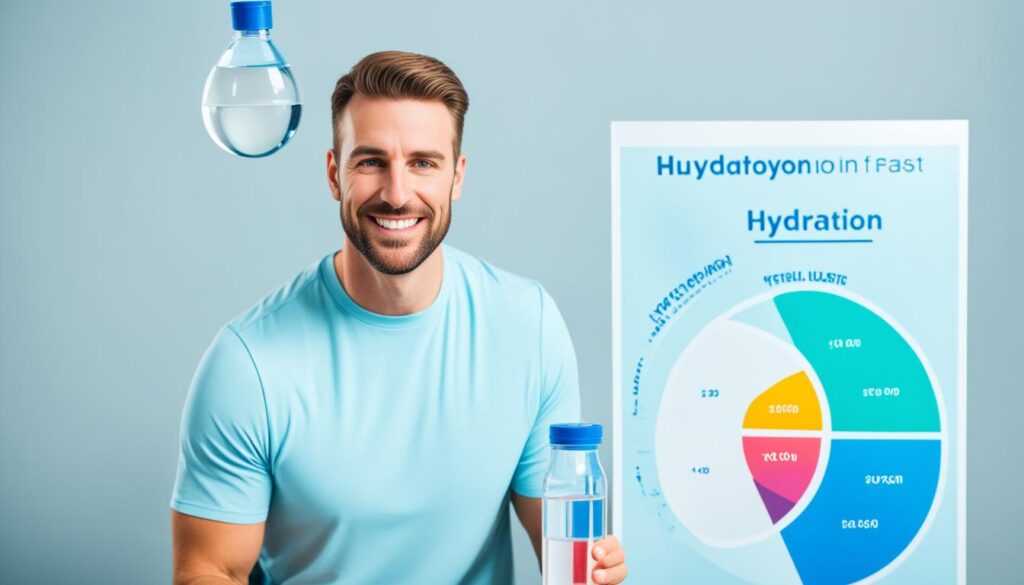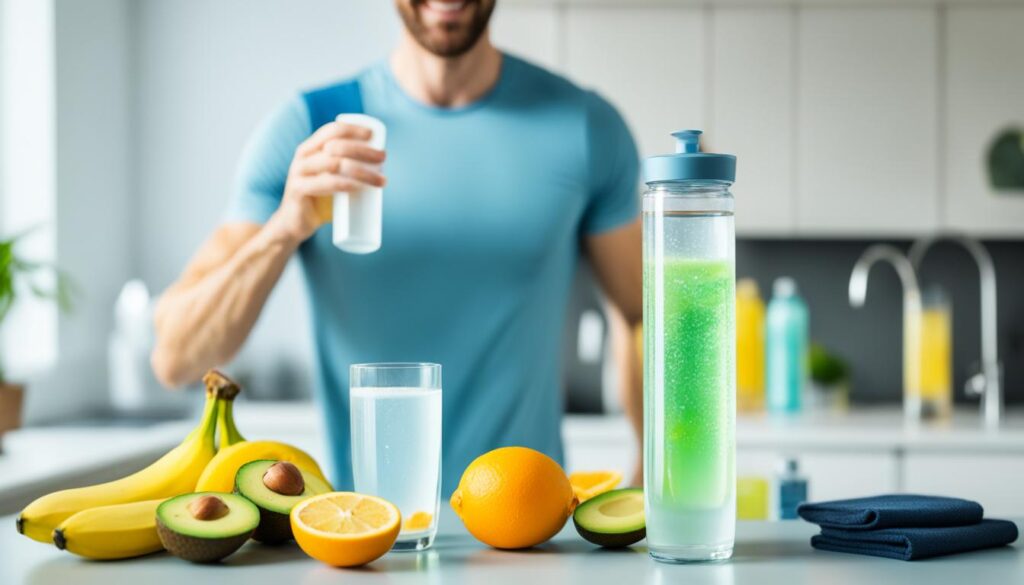Extended fasting can really change how hydrated we are, which many don’t think about. When you fast like in Ramadan or other diets, the risk of getting dehydrated is high. This is because we usually get 20% of our fluids from the foods we eat.
Foods with lots of water, like soups and watermelon, are great for staying hydrated. But, in a fast, you might not eat these. Also, cutting down on carbs, which happens in a lot of fasts, can make you lose stored water. A big study shows that staying hydrated is crucial during fasts of 4 to 21 days1.
Key Takeaways
- Extended fasting and hydration are intricately linked. Adequate water intake is critical during fasting periods.
- Approximately 20% of daily hydration comes from food, making water consumption even more essential during a fast.
- The reduction in carbohydrate intake during fasting can lead to decreased hydration levels due to loss of water stored with glycogen.
- Various fasting methods, including the 5:2 and 16:8, necessitate a higher awareness of hydration strategies.
- Studies, such as the one conducted by Wilhelmi de Toledo et al. (2019), highlight the importance of hydration over extended fasts1.
Why Hydration is Crucial During Extended Fasting
Staying hydrated is key during long fasts. When you don’t drink enough, it could cause big health problems. So, it’s super important to know about dehydration risks and drink plenty of water while fasting for health.
Understanding the Risks of Dehydration
Not drinking enough water can cause headaches. It might also lead to muscle spasms and nerve problems. This shows why it’s crucial to drink water carefully while fasting.
The Impact of Reduced Water Intake
Less water can directly affect the body. This is especially true when you cut out carbs. Without carbs, you lose water from your cells. So, if you’re not careful, this can make dehydration risks worse2. Also, before any surgery after fasting for 8–12 hours, it’s advised to drink water up to 2 hours before3.
Signs and Symptoms of Dehydration
It’s vital to spot the signs of dehydration early. Symptoms can include headaches, heart flutters, and muscle tightness. These are clear signs to drink more water and electrolytes. Intermittent fasting recommends certain drinks to avoid dehydration symptoms3. Not drinking enough during long fasts can cause severe muscle loss due to water balance issues2.
The Role of Water in Prolonged Fasting: What You Need to Know
Water is key for getting the most out of fasting. The usual water fast lasts 24–72 hours45. Being hydrated is vital during fasting. It’s to avoid dehydration and help your body work. It’s not always easy to tell when you’re thirsty. So, keep an eye on your urine color to check your hydration level.
“I can’t emphasize enough the importance of hydration during fasting. Simply relying on thirst signals isn’t adequate. Observing the color of your urine is a more reliable method for ensuring you are staying properly hydrated.”
Water does a lot during fasting to keep your body running smoothly. It helps with metabolism, digestion, and keeping your temperature right. If you eat too soon after a long fast, refeeding syndrome could happen, which is dangerous4. Drinking enough water makes going back to eating normal easier.
Hydration makes fasting better. Without enough water, you might feel dizzy, sick, or have constipation5. If water fasting causes dehydration, you could also get orthostatic hypotension5. So, drink enough water to avoid these problems.
One study had 12 men in their middle years fast for 8 days. The results showed changes in blood and urine, how their bodies were made, and how stressed they felt4. Sometimes, fasting can lead to tiredness, feeling sick, or getting headaches4.
Another research saw 48 people water fast for 10 days. They lost weight and their body mass index dropped, but 50% stopped because of side effects4. Water fasting might also lower triglycerides after fasting for 24 hours5. And it helps insulin and leptin work better for your health5.
To sum up, water is very important for fasting. Staying hydrated can boost the good effects of fasting. Always watch for signs of dehydration and keep up your water intake.
Estimating Your Hydration Needs During Extended Fasts
It’s crucial to stay hydrated during long fasts for your health and to maximize the fasting advantages. You can use different ways to make sure you drink enough water.
The Weight Method
The Weight Method suggests that for good health, adults should drink 30-35 mL of water for every kilogram they weigh during a fast6. This method helps keep your water intake right when fasting for a while.
The RDA Method
The RDA (Recommended Dietary Allowance) Method gives rough estimates on how much water people should aim to drink daily. It’s not as personal as using your weight for calculations, but it’s a good starting point.
The Fluid Balance Method
The Fluid Balance Method focuses on keeping a good level of hydration by considering how much fluid you take in and lose. Checking your urine color can tell you a lot about if you’re drinking enough, especially during longer fasts6.
Factors Influencing Hydration Needs
Many things can change how much water you need when fasting:
- Exercise: If you work out more, you’ll need to drink extra water.
- Age: Older folks might need to tweak their water intake levels during fasts.
- Ambient Temperatures: Hot weather will make you need more water.
- Medications: Some drugs can affect how much water you need, so be aware.
It’s key to think about all these aspects when figuring out your water needs for fasting longer. Remember, about 20 percent of the water you need comes from food. And don’t forget about how your body deals with less water and electrolyte shifts when you fast for an extended time7.

Maintaining Electrolyte Balance While Fasting
Keeping our electrolytes balanced is key during fasting. It’s essential to know how sodium, potassium, magnesium, and calcium work. They keep our bodies running and help us feel good when we fast for long periods.
Importance of Sodium
Sodium is key for our electrolyte balance especially when we fast. It helps control water, nutrients, and how our muscles and nerves work8. When we fast, we might lose a lot of sodium quickly. It’s important to add it back to avoid problems like dehydration and issues with our kidneys or heart9.

Role of Potassium
Potassium keeps our muscles’ fluid levels right and helps our nerves work well8. Having enough potassium during a fast stops muscle problems, tiredness, and keeps our hearts beating regularly10. Eat foods rich in potassium, such as avocados and greens, to help with fasting and staying hydrated.
Benefits of Magnesium
Magnesium is great for muscles, nerves, making energy, and strong bones8. It can help with headaches, cramps, and feeling sick, which are common when we lack electrolytes while fasting10. Eating nuts, seeds, and dairy or taking a good supplement can keep your magnesium levels up.
Calcium’s Essential Functions
Calcium is important for bones, a strong heart, and muscle control8. We need to make sure we get enough when fasting for over 48 hours. This prevents calcium problems and related health risks10. Ask a healthcare expert for advice on fasting right and keeping electrolytes in balance.
Tips for Staying Hydrated During Prolonged Fasting
Staying hydrated during a long fast is key for health and to avoid issues. Check the color of your urine. It should look like light straw when you’re well-hydrated.
If you’re doing things or are in hot places, drink more water. This replaces what you lose through sweat, helping you stay hydrated.
Adjust how much you drink when you work out. Exercise makes you lose more water. So, drink more to keep your body balanced.
Knowing the risks of dehydration is crucial. Not drinking enough during long fasts is a big problem. It can also lower key electrolytes, such as sodium and potassium11.
After you fast, be careful how you start eating again. Quick refeeding can lead to a dangerous shift in your body’s fluids and salts. Drinking enough water during your fast lowers this risk.
Some people should not fast for a long time. This includes those with certain health conditions or a history of eating issues11. Yet, short fasting periods or careful diet plans can improve heart health and lower bad cholesterol12.
Follow these tips to stay hydrated and make fasting safe and good for you.
Health Benefits of Proper Hydration in Extended Fasting
Drinking enough water is essential in longer fasts. It helps people get the most advantages from fasting. Fasts over 48 hours up to a week or more can improve heart health and boost metabolism. They also help the brain work better13.
For example, blood sugar levels were better in a 10-day fast. And there was less insulin resistance13. This shows how big an impact staying hydrated can have.
Also, water fasting is good for mental health. It can improve memory and overall brain health. Staying hydrated makes fasting safer and more beneficial for the brain13.
Water fasting cuts down on inflammation by about 30%. This is great for fighting chronic inflammation and staying healthy13. Fasting for a while boosts autophagy, which can help prevent aging and diseases13.
But, losing weight in long fasts might mean losing muscle too13. Drinking enough water helps protect muscles. It also avoids problems like metabolic acidosis, headaches, and feeling extra hungry13.
To wrap it up, staying hydrated is key in fasting. It prevents bad effects and boosts the good ones. Proper hydration ensures a healthy and balanced fasting experience.
Avoiding Common Pitfalls and Ensuring Safe Fasting Practices
Keeping fasting safe helps prevent common issues and lets us enjoy the health benefits. One key point is to drink enough water, about 2-3 liters a day, to keep from getting dehydrated. This stops problems like being grumpy or not being able to focus1415. We should also watch our salt and mineral levels to avoid lacking vitamins such as iron, calcium, and B1215. Some light exercises, like walking or doing gentle stretches, can be good during a fast14 too.
When fasting, it’s important to be careful when starting to eat again. If you eat too much too quickly, you could get refeeding syndrome. To avoid this, begin eating slowly, choosing five small meals throughout the day14. The CDC mentions that losing weight slowly is better for keeping it off14. Before and after fasting, following a Mediterranean diet can help balance your nutrition14.
Before you start fasting, talk to a doctor, especially if you’re a child, elderly, or have health problems that might make fasting unsafe1415. For some people, like those with certain health risks, doing short or intermittent fasting could be a safer option for weight loss and health gains14. Following the right steps will help you get the most out of fasting and lower any risks involved.
Source Links
- Is Water-Only Fasting Safe?
- What Is Water Fasting? Benefits, Risks And More
- Drinking Water While Fasting: Is It Recommended?
- Water Fasting: Weighing the Benefits and the Risks
- Water Fasting
- How to Stay Hydrated While Fasting – Zero Longevity
- How to Stay Hydrated While Fasting
- Electrolytes For Fasting: Essential Tips For Maintaining Balance
- Benefits of sodium while fasting (And how to get enough)
- Fasting Electrolytes
- 48-Hour Fast: How-To, Benefits, and Downsides
- 6 Tips for Healthy Fasting
- No title found
- Water fasting: Benefits, risks, and how to do it
- How to Fast Safely: 10 Helpful Tips




